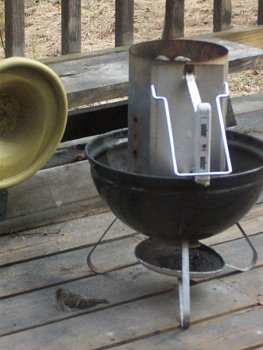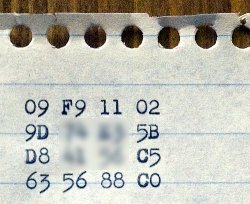Last night we had hamburgers for dinner because Fred Meyer didn’t have any good looking fish. I’ve been wanting to start a “Friday Night Fish Night” tradition to get more fish into our diet, but it’s hard when the local megamarket doesn’t have anything worth eating on Friday afternoon. We just bought a side of beef from a local meat company, and have some older frozen hamburgers in the freezer to eat before our all-natural Alaska meat shows up next week.
I use a chimney starter to get the coals going (it’s the silver tube sitting in the little Weber in the photo), and it must have been throwing off enough heat to warm up the redpoll in the photo. He’s in the lower left. He laid there for at least five minutes warming himself by the heat from the coals. Redpolls don’t appear to be all that smart (they’re called “pigpolls” by bird feeders around here), but this one really knew what he was doing. Click on the photo for a larger, and still fairly grainy image.

foreign spam
image by f_mafra
I maintain our departmental mail servers, and spend a fair amount of effort trying to reduce unsolicited email. One of the ways I do that is by collecting my spam and training our spam filter with it so our users won't see it more than once.
Today I got a hilarious email that must have been written in another language and then translated into English. It's first paragraph mentions a “most exciting lose flesh product available.” Sounds good! Better yet is this supposed testimonial from a guy in New York: “And you see me, the bed became cool also!” To quote Temperance Brennan: “I don't know what that means.”
I also don't know how I mange to “decline the preposition” and resist this exciting new product that “attacks unnecessary kilos.”
image by 500cpm, blurred by me
Apparently one of the encryption keys for the high definition DVD (HD-DVD) format has been discovered, and is now appearing and disappearing all over the Internets. The organization in charge of “administering” the encryption scheme has started sending out Digital Millennium Copyright Act (DMCA) takedown notices to Internet Service Providers and corporations whenever they find the key on a website. Here’s one such notice sent to Google. The incredibly stupid part about this document is that it contains the key they’re trying to hide in the letter, officially putting it in the public record.
The whole thing is ridiculous. If I buy an HD-DVD disc, I’m not allowed to make a copy of it in case my copy gets scratched or broken because doing so would require “breaking” the encryption which is a violation of the DMCA. The key is part of this process, so the content corporations are trying with all their might (and their lawyers in concert with the DMCA) to keep the key a secret so that people can’t make backups of the items they have purchased.
But you can’t take back a secret once it’s out. And even if you could, it’s ridiculous that it’s possible to shut down a web site because it contains a simple string of letters and numbers that by themselves mean absolutely nothing. Or a photograph of something that happens to contain the string (click on the image for a whole set of these from Flickr). The string isn’t copyrighted, and it’s not a trademark. It seems like free speech means I ought to be able to print this string of letters and numbers.
[Update: There's a great legal discussion of the issues at the Electronic Freedom Foundation's web site. The link is 09 f9: A Legal Primer. The gist is that putting the key on the Internet serves no other purpose than to aid in circumventing protected content, and thus, posters can be sued for “trafficking.”]
Here’s the secret key, which I’ve converted to bits and then encrypted: 00010011 11110010 00100010 00000101 00111010 11101001 11000110 10110111 10110000 10000010 10101101 10001010 11000110 10101101 00010001 10000000. Is this a violation of the DMCA? It’s not actually the key and thus is useless to someone who wants to exercise their right to make a backup of something they’ve purchased because I’ve “encrypted” it (does x << 1 mean anything to you?). Because I’ve encrypted it, does that give me protection under the DMCA? If I get a takedown notice, that implies that the laywer sending the letter has circumvented the access controls to my copyrighted data (because this post is Copyrighted, and so the bitstring is too).
When will this insanity end?
Books Acquired
- Chris Adrian. 2006. The Children’s Hospital. McSweeney’s. 615 pp.
- Richard Powers. 1995. Galatea 2.2. Perennial. 329 pp.
- Kahled Hosseini. 2003. The Kite Runner. Bloomsbury. 324 pp.
- Javier Marías. 1972. Voyage Along the Horizon. Believer Books. 250 pp.
- Yannick Murphy. 2006. Here They Come. McSweeney’s. 250 pp.
- Dustin Long. 2006. Icelander. McSweeney’s. 249 pp.
- Michael Pollan. 2006. The Omnivore’s Dilemma: A Natural History of Four Meals. Penguin. 450 pp.
Books Read
- J. Anthony Lukas. 1997. Big Trouble: A Murder in a Small Western Town Sets Off a Struggle for the Soul of America. Simon & Schuster. 880 pp.
- Chris Adrian. 2006. The Children’s Hospital. McSweeney’s. 615 pp.
- A. L. Kennedy. 2004. Paradise. Knopf. 304 pp.
- Jim Crace. 1999. Being Dead. Farrar, Straus and Giroux. 192 pp.
- Dustin Long. 2006. Icelander. McSweeney’s. 249 pp.
Big Trouble is a huge, sprawling story, principally devoted to the assassination of former Idaho governor Frank Stuenenberg in 1905 and the ensuing capture and trial of three of big labor’s most important leaders. I say principally because Lukas ranges all over the map, extensively considering each player in the drama, as well as significant coverage of people only tangentially related to the case (like pitcher Walter Johnson, who Clarence Darrow probably saw pitch in Caldwell while he was in town defending Haywood). The huge scope of the book, makes it a much richer history than just a detailing of the case, and the book really brings you into what was a critical time for labor and industry in American history.
A quick summary of the story appears on page 375:
Colorado’s mine owners hoped to rid themselves forever of these apostles of disorder. Their message to their counterparts in Idaho was blunt: Here are the bodies, here is the money, please kill them for us.
That may sound pretty ridiculous to us in 2007, but at the turn of the twentieth century, labor relations, especially in the Wild West were very unformed. Business owners rode roughshod over the workers, and the federal and state governments were always willing to step in against the workers. More often than not, federal troops showed up and arrested everyone present, men and women alike, and held them without charge for as long as they liked. There are interesting parallels with our current obsession with terrorism, as the labor leaders (and owners) sometimes employed terrorist tactics to strike back. The current detentions at Guantanamo Bay, the CIA smuggling enemy combatants overseas to be tortured and murdered, and the Republican politics of fear are all in evidence at the turn of the century in the West.
The book is great at recalling that time in our history. For example, in the courtroom in Idaho, Ethel Barrymore (grand-aunt to Drew Barrymore) attends one day of the trial and comments about how everyone in the courtroom was “chewing gum.” Actually, everyone was chewing tobacco and the courtroom was filled with spittoons for the men to spit into. Guns were everywhere, as were the Pinkertons who ran the entire investigation and had infiltrated Darrow’s defense team. It was a different world, and Lukas really brings it to life.
It’s been several weeks since I finished this book, and I’m still not sure what to make of it. It’s a great book; very enjoyable, and at the same time, filled with ideas about spirituality, the end of the world, and hope for the future. What surprised me most about the book was that it was both fantastical and spiritual at the same time, and each of those things individually will sometimes doom a book for me. When I was younger, I read everything Stephen King wrote, and I always enjoyed the more realistic books a lot more than the ones requiring too much suspension of disbelief. But even with all the plot twists, bizarre developments, and religion in it, I loved The Children's Hospital.
There’s a great review of the book at The Quarterly Conversation that I wish I’d read more carefully before reading the book. I generally avoid spoilers, but in this case, I think I might have gotten more out of the book if I’d been thinking about the things the review brought up. So, if you're willing, think about this stuff if you pick up the book.
Spoiler warning!
Among other things the review mentions, consider:
- Nine floors of the hospital: nine rings of hell / nine months of pregnancy
- Children inherit the earth
- Hospital: care without caring, like the earth that was flooded
- Why did each of the major “Thing”-s happen? Was someone to blame?
End Spoilers
The Children’s Hospital is one of those rare books that is so filled with ideas presented but not spelled out so that multiple readings and multiple readers can really bring a lot to thing about and discuss. It’d be a great book for a book group.
An enjoyable read, especially after The Children’s Hospital. It’s sort of like a fictionalized version of Caroline Knapp’s Drinking: A Love Story; it's got lots of drinking, and a love story but it’s the sort of dysfunctional love story that only a pair of alcoholics (see Charles Bukowski) could have. What Kennedy brings to the book is the ironic, completely un-apologetic main character of the story.
For example, page 71-72:
Being me is a job---is labour so time-consuming and expensive that I have to have a second job just to support it. So that I can drink, I have to get drink and that isn’t something people give away and then there’s the drink that I need because I have drunk and the other drink I have to keep around because, sooner or later, I will drink it. That’s a full-time occupation: that’s like being a miner, or a nurse.
Being Dead goes back and forth in time from the murder of the two main characters in the story, brutally killed on the beach in a romantic moment trying to relive a bit of their past. Having read Mary Roach’s Stiff much of the process a corpse goes through after death was familiar to me, but the book put a more human face on it. I’ve read reviews that suggest the book is romantic, but I really didn’t see it. Instead of romance, I’d say this book offers realism; the reality of death and what it does to those who die and those who survive, as well as the reality of a long marriage between two people. A quick, enjoyable read. He’s got a post-apocalyptic novel coming out in May, which looks interesting. “Less crushing than Cormac McCarthy’s The Road and less over-the-top than Matthew Sharpe’s Jamestown,” says Publisher’s Weekly about the new book.
Great book, highly entertaining detective story mixed with post-modern metafiction. I wrote about this book when I finished it a couple weeks ago. This, and The Children’s Hospital are the clear winners for this month. Both excellent books, one serious, one funny, but both very rich and rewarding.

photo by jetalone
Michael Pollan was interviewed for the April 2007 issue of The Believer magazine. I've been a fan of his writing since The Botany of Desire, and although I haven't gotten around to reading The Omnivore's Dilemma, from reading the interview, I'm sure I'll like it.
You know, compared to the early 1960s, the percentage of our income that goes to food has fallen from 18 percent to less than 10 percent today. We're paying less for food than anyone on Earth, anyone in the history of our planet, in fact. But in that same period, the percentage of our national income that goes to health care has risen from 5 percent to 16 percent today. Some of that increase, not all of it, is the result of eating terrible, cheap food. If we spent a few more percentage points of income on food, we could surely spend a few percentage points less on health care. What I'm suggesting is that spending more on food, as a society, will not end up costing us more overall.


